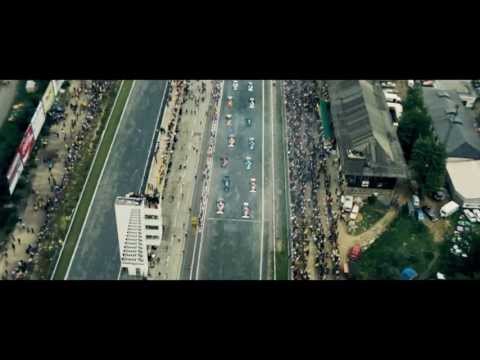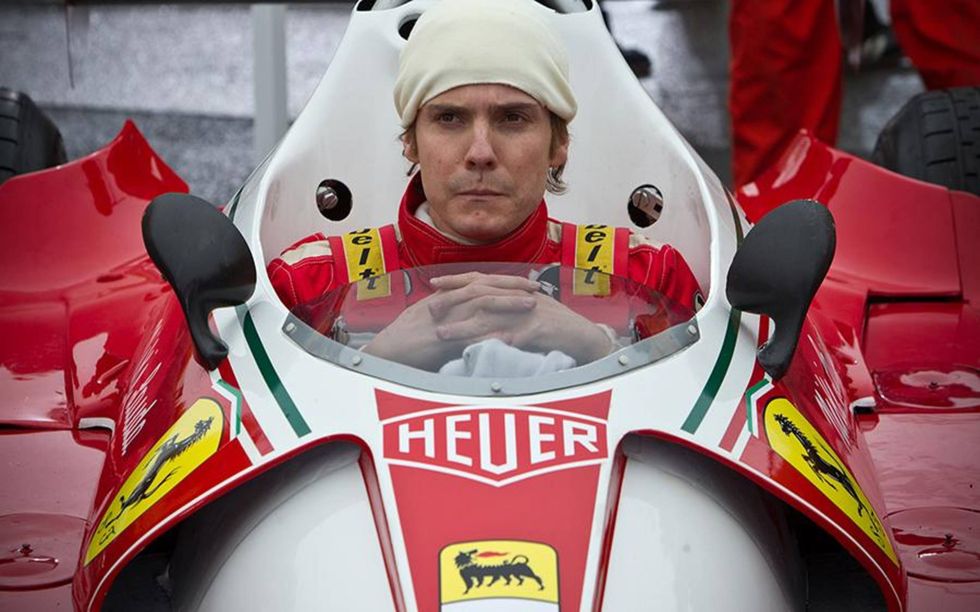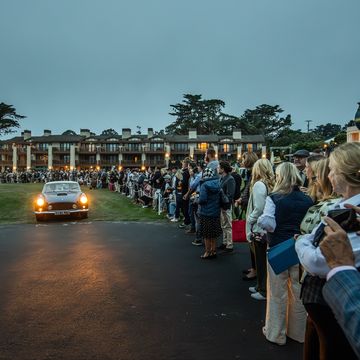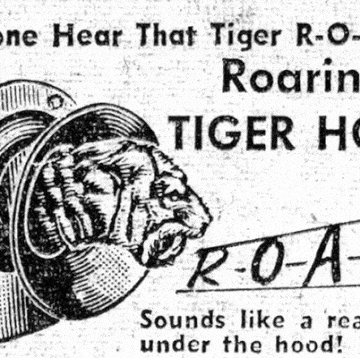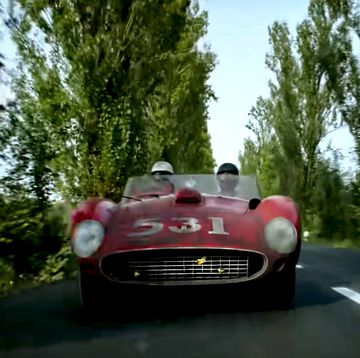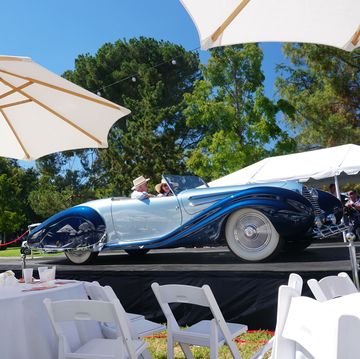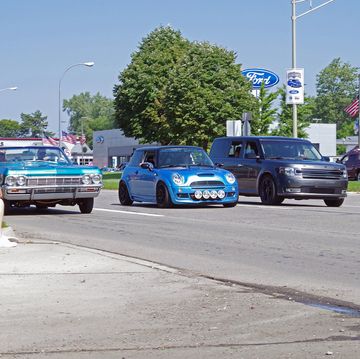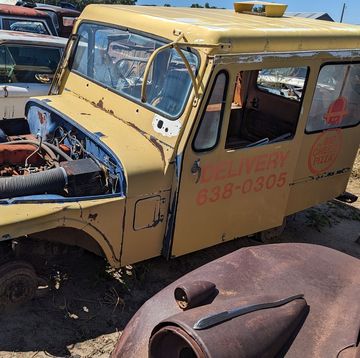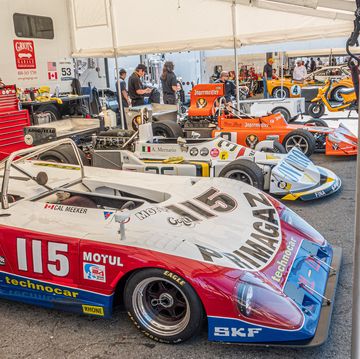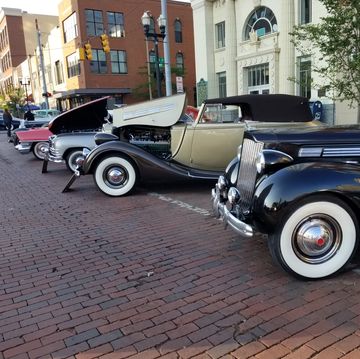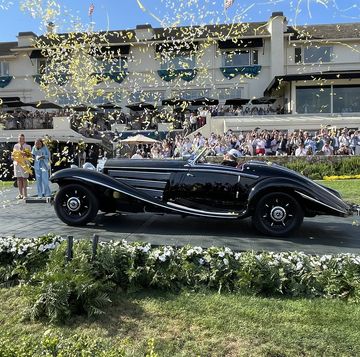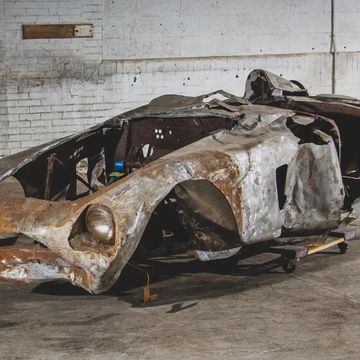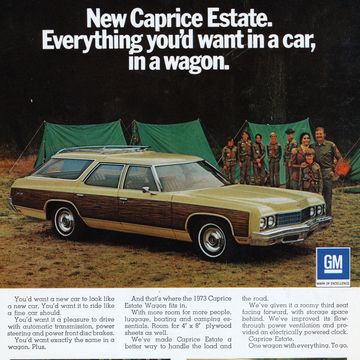Normally we review cars this way: Everybody drives them then we all pitch in our thoughts and present them in a "drive review." So when "Rush" finally came out, we treated it like a new Ferrari -- everyone drove it and everyone compiled their thoughts in one heap. This is a big heap, but it's a big movie.
WEST COAST EDITOR MARK VAUGHN: The James Hunt/Niki Lauda rivalry might not have existed except for Lauda's terrible crash at the Nürburgring. Lauda was ahead in points at the time and everyone else on the grid would have otherwise been fighting for second place. But the crash gave the talented but not-quite-as-talented Hunt a chance, which he took with reckless abandon.
Therein lays the plot of the movie, revealed turn by turn under Ron Howard's excellent direction.
Hunt, for whom the term "playboy" has not been overused, perhaps knew he was getting his 15 minutes of fame and wanted to use every second of it. The exacting Lauda, meanwhile, planned every corner of his rise to racing success. Hunt says that people find the ever-present specter of death in racing sexy: "The closer you are to death, the more alive you feel." Lauda doesn't like anything at all about death, especially after his accident brought him so close to it, and instead calculates that he has "a 20 percent chance of dying every time" he races but that such a number is "acceptable." Hunt spends every free moment knee-deep in a dalliance. Lauda spends it elbow-deep in the chassis, re-engineering his car. The character contrasts are as intriguing as the overblown rivalry.
At first you think you like Hunt more, because he simply seems to be more likeable as the life of the party. But after a while you see Lauda's character as the stronger and more admirable of the two, even though he glowers just a little too much.
Race fans will take glee in pointing out every inaccuracy in the movie, and there are several "compressions" and reorganizations of facts here, ably pointed out by my Autoweek colleague Adam Cooper in our latest magazine issue. (Those stories are coming here shortly to autoweek.com.) But you can't be completely accurate and make a 123-minute movie work. So they're forgivable. Nevertheless I found myself wondering throughout the film about many things, including:
1. Did these two guys really hate each other this much?
2. Was Lauda really despised that much?
3. Did Hunt really have that much sex?
There has been speculation about whether this movie will draw non-race fans, but that speculation is done here in America, where, apart from you and I, people think Formula One is something you feed to babies. In the rest of the world, F1 is more popular than wrestling, presidential primaries and NASCAR combined. The rest of the world is already looking forward to seeing this. The American market may not be the biggest audience for it but it'll be big enough. Even non-race-savvy movie-goers will like it, the story is so compelling. Lauda's towering will, the strength he drew on to come back to the racetrack even though he was still a long way from recovered from his horrifying injuries, is more compelling than Hunt's wild-thing shenanigans. Yes, you'll like it and yes, your non-racer girlfriend/boyfriend will probably like it, too.
So go see it. But please, drive safely.
ASSOCIATE WEST COAST EDITOR BLAKE Z. RONG: "I accept every time I get in the car," shouts Niki Lauda in the drivers' meeting before the 1976 Nürburgring Grand Prix, "there's a 20 percent chance I could die."
"Rush" opens up with a visual rendition of the cliché "it was a dark and stormy night," or at least afternoon; it ends with a sunset that casts a shadow on two of the greatest drivers ever to helm F1. We know the ending of the 1976 season-it's presented here in an excellent BBC documentary, if you want the facts without the pretense. Hell, most of the trailers give away too much of the movie for comfort. But it's the journey to get there that's the most interesting story: it's the idea that these real-life events are so neatly packaged into the Hollywood blockbuster it deserves.
We can safely say this right now: this has been the most anticipated movie since the Internet got wind that Ron Howard, the Ron Howard, was doing a movie about cars; no, wait, a movie about racing; whoa, hold on, a movie about 1970s racing. You know, "back when sex was safe and racing was dangerous," Howard said, laughing, when I spoke with him in July. It's a bold and diverse subject, sure, but Howard has never been one to shy away from a bold and diverse subject.
Neither is scriptwriter Peter Morgan, who initially penned the script for "Rush" as a spec, before anyone was attached to the project. He previously wrote "Frost/Nixon", with which he worked with Howard; as well as "The Queen", "The Last King of Scotland", and "The Other Boleyn Girl"-all highly acclaimed films about the past, seen through the vision of contemporary storytelling.
Likewise "Rush", uh, rushes through this character development as its most establishing groundwork. Lauda is calculating, analytical, slightly boring and uncharismatic in that stereotypical German/Austrian sense; if he was a schoolchild today, we'd label him with social anxiety and dose him up with meds. James Hunt is a Caligula of a man, and his oft-reported exploits have entered the realm of legend. But Hunt has a morbid sense of reality, and of his impending death -- which would eventually happen off the track, felled by a heart attack at 45. (He would have been 66 in August.)
Daniel Brühl plays Lauda as brooding, more focused, dispassionate to others yet begrudgingly respected by all he encounters. Chris Hemsworth saved the film's budget by not requiring a hairstyle change in between filming Thor sequels; his Hunt uses sex as a crutch to hide his own turbulent emotions. The ladies flock so easily! If anything, the individual scenes of Lauda and Hunt play like Robert Smith to Iggy Pop, if one can be allowed to make such an analogy.
The cinematography is beautifully atmospheric -- each frame has a distinct color palette: blues for London, greens for the rain in Germany and Japan, browns and yellows for Italy. We see close-ups of velocity stacks, spheres of flame shooting across the Ferrari 312T's combustion chambers -- but we also see unusual shots of gearshifts performed while tucked inside the footwell of Hunt's McLaren-Ford, practically smelling his size 12 feet. After more shots of gauge needles revving to 12,000 RPM, you almost want them to get on with the race already. And then, they do.
The racing is what we come here for, of course. It's shot in the fast-paced style that reflects our millisecond attention spans; some might find issue with the lack of detail, of actually watching the cars do their thing in their natural state. Perhaps, but the detailing is just right: the livery is accurate, the fashions are pure '70s, the cars scream and howl and claw for grip just like they do at the Monterey Motorsports Reunion.
"Rush" speeds through the ancillary 1976 races with the speed and slickness of a music video montage. Key elements of the season are retained: the
at Spain is discussed neatly, for example, with plenty of shouting and dirty looks. At certain points, the movie bears down with heavy-handedness. One scene depicts a gruesome accident that only serves to shove the character development along; even months after I first saw it, the scene still sticks as brutally unnecessary. Lauda recovers in the hospital for two months, and we're there to experience every singe of flesh, every painful bronchoscopy, every bit of sludge vacuumed from Lauda's smoke- and debris-charred lungs. Emotional points register with Hans Zimmer's always excellent score, but after a while it's overwhelming.Then again, Howard never intended to make this movie just for us Americans. Maybe we're just a little too hand-wringy, you know?
Already, the reaction of "Rush" as a car movie is gaining ground: comparisons have been made, and rightfully so, to "Le Mans" and "Grand Prix" and "Winning", movies about racing directed (or starring) race-car drivers. Not a self-proclaimed car guy, Howard nonetheless capped his time in the world of automotive enthusiasm with a lap at Top Gear's track.
Should that matter? No, it doesn't. Because the two are just as comfortable exploring unfamiliar territory as any of us could have accomplished. Because at this juncture of talent money, and nostalgia, "Rush" is the highest tribute we can get to our strange and depraved hobby of holding fast to four-wheeled machinery; a rare feat from Hollywood powerhouses who think like us even when they don't always think of us.
AUTOWEEK RACING CORRESPONDENT STEVEN COLE SMITH: If you're going to anoint “Rush” as probably the finest motorsports movie ever made, you have to add this to the context: There have been a bunch of really crappy motorsports movies. I'm aware “Grand Prix” and “Le Mans” have their acolytes, but on balance, I submit that “Rush” is the best of that trio.
Of course, if you're looking for realism, that's probably “Talladega Nights,” especially given the comedy stylings of Clint Bowyer and Ty Norris of Michael Waltrip Racing at Richmond a couple weeks ago. Interesting that a movie and a race-car team can both be characterized as “a sellout.”
If “Rush” wasn't pretty close to what actually happened, you'd be tempted to suggest the plot is a little thin and off-the shelf: Two promising, well-heeled young racers, against their family's wishes, become professional drivers and ascend from the minor leagues to Formula One almost before you've settled into your seat.
There's Lauda, a monochromatic Practical Pig, and Hunt, the blonde party boy who teams up with Lord Hesketh, the mildly libidinous car owner who decades ago might have been played by Fatty Arbuckle.
In most movie pitch meetings, Lauda would help Hunt ace his final exams, and Hunt would help Lauda get a date with the hot cheerleader for prom, but fortunately we stick with racing here, and Hunt and Lauda never become BFFs.
You can't fault the performances of Chris Hemsworth as Hunt and Daniel Brühl as Lauda; Brühl is given far more to do, and if there are any Oscar nominations for “Rush” actors, he should be first in line. Peter Morgan's screenplay is spare and seldom sags, and reliable Ron Howard reminds us of what a good director he can be, spending the money exactly where it had the most impact. Drama doesn't have to be manufactured when plenty is present in real life, and Howard and Morgan let the movie go where the story takes them.
That said, we have to remember that if we're on this Web site, we're all members of this church -- some of us card-carrying voices in the choir -- so we go into the theater with some knowledge of Formula One in general, probably Lauda and Hunt's tale in particular. So far non-fans seem to be taken with the tale too, which suggests Howard has done his job in making the sport accessible enough for newcomers to sign on quickly. You don't have to know anything about racing to appreciate “Rush,” yet those of us who do never suffer from remedial backgrounding.
The quick-cut racing footage is believable and only slightly ADD-inspired, and Lauda's plot-pivotal crash is handled skillfully. As with any film, I would have liked a little more of that, a little less of this, but the bottom line: A masterful, compelling movie with no major flaws. Well done.
SENIOR EDITOR AT LARGE J.P VETTRAINO: With new cars and movies, expectations play big. Especially when Formula One is the topic. Expect a really good one, and a decent one can disappoint. In the case of “Rush,” Ron Howard's film about the rivalry between James Hunt and Niki Lauda through the 1976 world championship, expectations are complicated by the subject matter. If you're a fan or follower of auto racing (regular readers here probably are) and generally know the story going in, do you expect more or less than the typical movie-goer? Do you need to take more away?
There's a lot to like in “Rush,” starting with the cinematography. Lacking a more appropriate term, the layman might call it Vintage HD: a blend of digital detail and density with the subtlety of film, and a period-appropriate patina. The race scenes are still informed by John Frankenheimer's 1966 film “Grand Prix,” but nonetheless convey the intensity and challenge -- yes, the rush -- that are auto racing.
During the hospital scene after Lauda's fiery Nürburgring crash, as a doctor inserts a stainless steel tube into his throat to “vacuum” his lungs, you might be asking: do we really need to see this? Yeah, maybe we do, if we've yet to grasp the risk racers accept for passion. Throughout there is a healthy dose of exposed flesh --certainly more than we've seen in a Howard film. You decide if you need to see that.
Acting in “Rush” is rarely bad. In the case of Daniel Brühl's Lauda, it's very good. The German Brühl may not storm America as Austrian Christoph Waltz did in “Inglorious Basterds,” but his portrayal of Lauda will ring true with anyone who has heard the driver speak. Brühl crafts a character who is sometimes brilliant, sometimes annoying and always convincing, even when the dialog is not his best tool.
The dialog and voiceover in “Rush” can be pedantic and heavy handed, explaining rather than demonstrating. That may be unavoidable when one condenses a 16-race season and chunks of two racing careers into two hours of film.
“Rush” is a theatrical film. Quibbles with factual representations are a waste of time. In broad strokes, the story holds true to what occurred, and it conveys a rivalry that was on some level genuine--between two very different drivers, driven by different demons, ultimately alike and alone.
Don't bother with the best-racing-film-ever thing. Be happy that a respected director has attempted to capture what lures us to the game and take it mainstream. If all films are rated with five stars, “Rush” probably gets three.
It won't change your mind about what is more important in auto racing -- the art or the science, the passion or the discipline, the brain or the seat of the pants -- but it will reinforce what you've already decided.
SENIOR MOTORSPORTS EDITOR MAC MORRISON: “Rush” might be a little too easy for extremists to critique, regardless of which point of view they take. Diehard racing fans might be expected to equally apologize for some of the movie's Hollywood devices, or tear it apart for every microscopic inaccuracy or trivial liberty taken. Typical movie-watchers will likely enjoy it greatly for what it is -- a fun, exciting story -- or pick at what are sometimes overly force-fed, simplistic and somewhat clichéd means of telling the audience how to feel, and why to feel that way.
Going into the theater I expected to either love “Rush” or hate it. Instead I emerged two hours later somewhat perplexed that I fell somewhere in between.
In terms of accuracy, the story is about as spot-on as I could have asked for. Yes, the bitter rivalry and personal contempt implied between Hunt and Lauda through most of the production is not at all accurate -- but this doesn't bother me as I know it will some people. Look, this is a movie, not a documentary, and I appreciate the need for a contentious relationship to drive the story forward. It's what audiences are used to and what they expect, and I credit both actors because you find yourself liking their characters equally, and Brühl as Lauda is mostly fantastic.
Also fantastic are the images, the cinematography and the overall visual depth. If HD existed in the '70s, this is how I would expect many movies from the decade to look. Automotive/racing enthusiasts should see “Rush” just for the cars, both on the track and on the road, and of course the action sequences.
Perhaps I knew too much -- OK, pretty much everything, or at least everything significant -- about this story already. It takes away any potential “on the edge of your seat” stress or adrenaline when you know what happens all along the way and how the whole thing is going to conclude. In that sense I envy people who know nothing about this slice of F1 history; in the end they might be better judges of “Rush's” pure entertainment value, and I expect them to find the whole thing much more suspenseful than F1 aficionados will.
That's the one big downside of making a movie about a true story but it's by far the better way to go, given the results in other racing films written from scratch. And for those who do know what happens story-wise, there are little Easter eggs to enjoy that the average viewer will miss. Vettraino -- who covered racing for years at Autoweek -- and I sat there pointing, whispering and laughing (in a positive way) at the appearance of period-correct road cars, Grand Prix legends like Tyrrell's six-wheeler, Clay Regazzoni's unmistakable personal style, brief glimpses of other drivers' names and helmets, the character that was Lord Hesketh … there's a good helping of things for geeks to geek-out on.
My gut tells me that “Rush” ultimately passes my personal acid test: will I find myself watching it repeatedly when it hits rotation on TV? Yes, I think so. It's a fun movie that looks and sounds great for its majority, and there's nothing about it that really insulted me or pissed me off. In other words, there's no fatal error I just can't get past. Yes, some of the dialogue is ridiculously cheesy, and the voiceovers -- though understandable from a production and limited-time/complex subject-matter standpoint -- begin to irritate.
Great movie? No. But “Rush” is a good movie, and now that we've finally seen the finished product, we might forget how difficult it is to make F1's technical complexities and its characters accessible and understandable to mainstream audiences. That “Rush” does so relatively effortlessly is something for director Ron Howard and writer Peter Morgan to be proud of.
ASSOCIATE MOTORSPORTS EDITOR MIKE LARSON: As far as racing movies go, Rush is easily in the top three. Although when you are competing with the likes of “Driven,” “Days of Thunder,” and “Stroker Ace,” you aren't exactly dealing with heavyweights.
Kudos to Ron Howard and Co. for making a somewhat-historic movie that still has an entertaining plot. However, for a “racing” movie, I would have liked to see more, well, racing. The movie does stand up well on its own, and when there was racing action, the visuals were breathtaking, especially Lauda's fiery crash in Germany. Overall, it's a pretty good movie and I'd definitely watch it again.
ASSOCIATE EDITOR JAKE LINGEMAN: “Rush” plays out more like a familiar movie drama than an all-out F1-geekfest like the “Senna” documentary. There was a good amount of racing, enough to keep a fan occupied, but it wasn't so technical that a casual or non-fan would be bored.
For the few points in the film that did need explaining, director Howard needed to have the actors talk it out, which did throw me a bit. But I think that will probably be good for the non-F1-watching public.
The animosity between Hunt and Lauda is obviously exaggerated on the screen. Daniel Brühl does a spectacular job as the calculating and sometimes cocky Lauda, while Hemsworth does his best ladies-man impression, which seems predictably natural.
The best part of the movie is that viewers can identify with either Lauda or Hunt, and they both get some sort of redemption in the end.
SENIOR ONLINE EDITOR RORY CARROLL: I am picky when it comes to movies. I am not what you'd call a movie expert, but I have some opinions. So, just because I am not in love with this movie doesn't mean you won't like it. Overall, I thought it was pretty good.
There are plenty of good things about the movie, such as:
--The racing footage is very good, provided you don't mind that a lot of weirdly shaky camera work is used to make things that are inherently dramatic -- like cars going fast -- seem dramatic. Also the whole film is shot in Instagram, but I like Instagram so, eh.
--Thor, er, I mean Chris Hemsworth, is pretty good despite being given a pretty trite take on Hunt from the writers and having to say the most cheese-ass lines since, “I live my life a quarter-mile at a time.” The guy from The Edukators (disliked) and Inglorious Basterds (liked) was also very good, despite a script that basically had him spelling out his every thought and motivation.
-- There are at least four exposed breasts, which was a welcome surprise. But come on, why are they there? Serving the story? No. Keeping us interested? Maybe. Making this an R rated film -- for very serious grown-ups only -- maybe.
--It's better than any other non-documentary racing movie which … ok, obscenely low bar.
There are a few bad things about “Rush” too, such as:
--Voiceover. It's not always bad but it is always a red flag for me and there sure is a lot of it in “Rush.” Besides being distracting, it usually says either, “Hey, we're going to struggle for way more than an hour to tell this story,” or, “Since you're too stupid to pick up anything on your own, I'm just going to go ahead and spell it out for your simple ass.” In “Rush,” those first few moments of voiceover say both things, then a whole bunch of really awkward exposition really takes over as far as the beating you over the head with background information goes. In the old days, they used to show newspaper headlines with music in the background. In really good movies, they don't assume that you're an idiot, or they do but they're a bit more subtle about rubbing it in.
--If you are a racing nerd, skip it. Or at least go into the theater knowing that it's not historically accurate.
--The movie often feels like the screenwriters and director would have preferred to just tell us how we should be feeling about each scene. “OK, Lauda's in the hospital, he's in a lot of pain. You should empathize, but be grossed out and kind of rooting for him.” Or, “Ok, there are things here that are dangerous, and also fast.”
All that said, I really think people should go see this movie. Making a Hollywood movie must be the most awful, soul crushing experience that a creative person can have. It's hard to imagine any endeavor outside of maybe designing a car where the product is more subject to the whims of humorless accountants and soulless marketers. So, the fact that this one turned out pretty good is really a triumph.
It's a major step forward for racing on film. If enough people see it, maybe we'll get a truly great racing movie someday. I'm sure this one will do well enough outside the U.S. to justify taking another stab at it.
